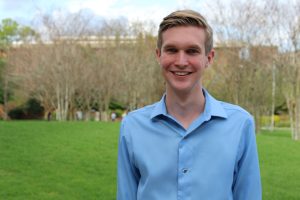
Discussions on ethics are happening in our society at all times, whether we are aware of them or not. Christopher Larson, a UCF student majoring in Philosophy, understands this idea that moral principles create the basis of almost everything, from politics to interpersonal relationships.
“It’s impossible to not have an ethic,” said Larson. “From the simple act of streaming a pirated a movie or breaking up with your romantic partner to protesting the president’s DACA policies, everything carries with it an implicit ethic.”
Larson recently traveled to Lexington, Virginia to represent UCF at the only undergraduate conference in the United States dedicated solely to ethical issues. Washington & Lee University, the host of the annual event, invited Larson to present his research paper, “Taking Pythagoras to Dinner, or, The Ethics of Journalistic Objectivity,” at the conference. His paper was also published in the university’s peer-reviewed Mudd Journal of Ethics.
Hailing from the small town of Sorrento, Larson has lived in Central Florida since the age of five. Now nineteen, he chose to study philosophy to prepare for a rather unconventional career goal: becoming a pastor. Breaking conventions appears to be a trend for Larson, who chose to attend UCF for its unique and innovative approach to education.
“UCF offers a lot of flexibility and variation in its coursework. Its sheer size also means I can piece together a non-traditional route through college pretty easily,” said Larson. “The Philosophy Department in particular has been especially helpful throughout my time here and incredibly supportive of my rather eclectic interests.”
In his published paper, which grew out of a final project in Michael Strawser’s Honors Case Studies in Ethics class, Larson examines the notion — and pitfalls — of journalistic objectivity.
“My basic argument in the paper is that journalistic objectivity, if understood as the use of techniques and methods that can unconditionally arrive at a neutral translation of reality, is problematic,” said Larson.
Overall, Larson wants others to see that studying ethics has a profound impact on the world beyond just being an attempt to differentiate between right and wrong.
“Ethics, to me, isn’t so much about figuring out how to follow some rigid set of rules to be a ‘good person’, but rather to discover what habits and actions will shape your desires in ways that will benefit yourself and the people around you,” said Larson.
The Department of Philosophy challenges graduate and undergraduate students like Larson to think outside of the box through courses that focus on argument analysis, theoretical discussion, art, religion, culture, history and more. Would it be unethical to not visit philosophy.cah.ucf.edu and learn more about their programs? There is no right or wrong answer, but based on Larson’s praise for the Philosophy Department, one could argue that investigating is a good decision for students seeking an interdisciplinary, thought-provoking major.